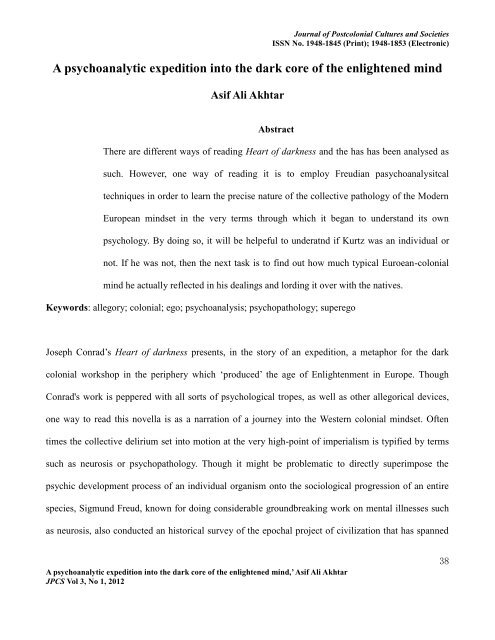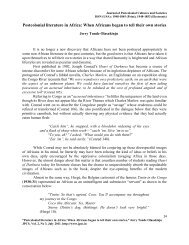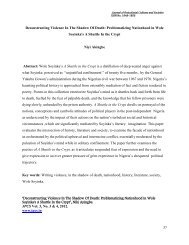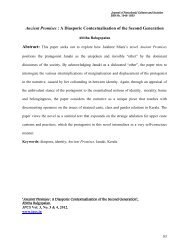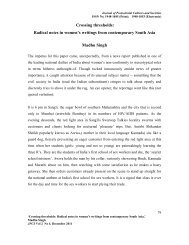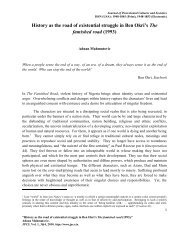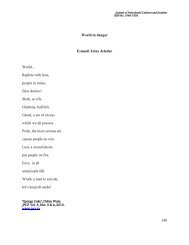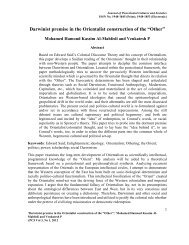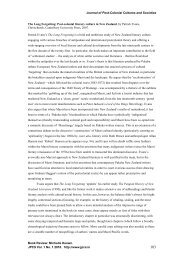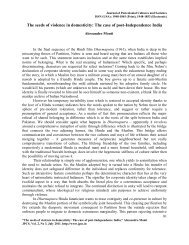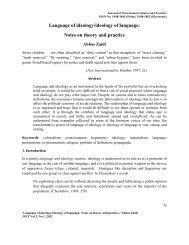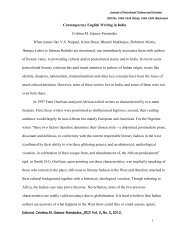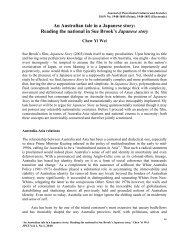A psychoanalytic expedition into the dark core of the ... - JPCS
A psychoanalytic expedition into the dark core of the ... - JPCS
A psychoanalytic expedition into the dark core of the ... - JPCS
You also want an ePaper? Increase the reach of your titles
YUMPU automatically turns print PDFs into web optimized ePapers that Google loves.
Journal <strong>of</strong> Postcolonial Cultures and Societies<br />
ISSN No. 1948-1845 (Print); 1948-1853 (Electronic)<br />
A <strong>psychoanalytic</strong> <strong>expedition</strong> <strong>into</strong> <strong>the</strong> <strong>dark</strong> <strong>core</strong> <strong>of</strong> <strong>the</strong> enlightened mind<br />
Asif Ali Akhtar<br />
Abstract<br />
There are different ways <strong>of</strong> reading Heart <strong>of</strong> <strong>dark</strong>ness and <strong>the</strong> has has been analysed as<br />
such. However, one way <strong>of</strong> reading it is to employ Freudian pasychoanalysitcal<br />
techniques in order to learn <strong>the</strong> precise nature <strong>of</strong> <strong>the</strong> collective pathology <strong>of</strong> <strong>the</strong> Modern<br />
European mindset in <strong>the</strong> very terms through which it began to understand its own<br />
psychology. By doing so, it will be helpeful to underatnd if Kurtz was an individual or<br />
not. If he was not, <strong>the</strong>n <strong>the</strong> next task is to find out how much typical Euroean-colonial<br />
mind he actually reflected in his dealings and lording it over with <strong>the</strong> natives.<br />
Keywords: allegory; colonial; ego; psychoanalysis; psychopathology; superego<br />
Joseph Conrad’s Heart <strong>of</strong> <strong>dark</strong>ness presents, in <strong>the</strong> story <strong>of</strong> an <strong>expedition</strong>, a metaphor for <strong>the</strong> <strong>dark</strong><br />
colonial workshop in <strong>the</strong> periphery which ‘produced’ <strong>the</strong> age <strong>of</strong> Enlightenment in Europe. Though<br />
Conrad's work is peppered with all sorts <strong>of</strong> psychological tropes, as well as o<strong>the</strong>r allegorical devices,<br />
one way to read this novella is as a narration <strong>of</strong> a journey <strong>into</strong> <strong>the</strong> Western colonial mindset. Often<br />
times <strong>the</strong> collective delirium set <strong>into</strong> motion at <strong>the</strong> very high-point <strong>of</strong> imperialism is typified by terms<br />
such as neurosis or psychopathology. Though it might be problematic to directly superimpose <strong>the</strong><br />
psychic development process <strong>of</strong> an individual organism onto <strong>the</strong> sociological progression <strong>of</strong> an entire<br />
species, Sigmund Freud, known for doing considerable groundbreaking work on mental illnesses such<br />
as neurosis, also conducted an historical survey <strong>of</strong> <strong>the</strong> epochal project <strong>of</strong> civilization that has spanned<br />
A <strong>psychoanalytic</strong> <strong>expedition</strong> <strong>into</strong> <strong>the</strong> <strong>dark</strong> <strong>core</strong> <strong>of</strong> <strong>the</strong> enlightened mind,’ Asif Ali Akhtar<br />
<strong>JPCS</strong> Vol 3, No 1, 2012<br />
38
Journal <strong>of</strong> Postcolonial Cultures and Societies<br />
ISSN No. 1948-1845 (Print); 1948-1853 (Electronic)<br />
<strong>the</strong> better part <strong>of</strong> <strong>the</strong> development <strong>of</strong> <strong>the</strong> human species in Civilization and its Discontents. If used to<br />
reread Conrad’s metaphorical language <strong>of</strong> <strong>the</strong> tale <strong>of</strong> Kurtz told through Marlow’s voice, Freud's<br />
analysis might prove useful in psychoanalyzing <strong>the</strong> modern mind <strong>of</strong> <strong>the</strong> Enlightened European. As <strong>the</strong><br />
19 th century European literary novel meets early 20 th century <strong>psychoanalytic</strong> <strong>the</strong>ory, this encounter<br />
might reveal to us <strong>the</strong> precise nature <strong>of</strong> <strong>the</strong> collective pathology <strong>of</strong> <strong>the</strong> Modern European mindset in <strong>the</strong><br />
very terms through which it began to understand its own psychology. Though a tempting prospect, in<br />
order to avoid <strong>the</strong> danger <strong>of</strong> superimposing a structural coherence onto a literary narrative, this essay<br />
will not attempt to undertake what could be called a Freudian reading <strong>of</strong> Conrad’s novella. It will,<br />
however, try to tease out some Freudian <strong>the</strong>mes within this work <strong>of</strong> fiction. It is hoped that a<br />
<strong>psychoanalytic</strong> exploration would enable <strong>the</strong> excavation <strong>of</strong> some <strong>of</strong> <strong>the</strong> <strong>dark</strong>er secrets that lay hidden,<br />
repressed in <strong>the</strong> neuroses and psychoses that raged within <strong>the</strong> enlightened mind <strong>of</strong> modernity.<br />
It would be obviously problematic to attribute dynamics <strong>of</strong> <strong>the</strong> Freudian psyche onto <strong>the</strong> lives <strong>of</strong> actual<br />
individuals, but ins<strong>of</strong>ar as Heart <strong>of</strong> <strong>dark</strong>ness is a work <strong>of</strong> fiction, it might afford us <strong>the</strong> luxury to<br />
examine is as a specimen representative <strong>of</strong> <strong>the</strong> topography <strong>of</strong> <strong>the</strong> modern European mind. Given that<br />
most <strong>of</strong> <strong>the</strong> narrative is a long drawn out confession on part <strong>of</strong> <strong>the</strong> main narrator named Marlow, <strong>the</strong><br />
monologue could be read as an outpouring <strong>of</strong> <strong>the</strong> repressed conscious (and here we might imagine a<br />
psychoanalyst seated among his silent audience). The metaphor <strong>of</strong> <strong>the</strong> exploratory <strong>expedition</strong> which<br />
might represent <strong>the</strong> colonial project as a whole could also be read as a kind <strong>of</strong> self-exploration <strong>of</strong> <strong>the</strong><br />
<strong>dark</strong>ened contours <strong>of</strong> colonial psychology. Moving one step fur<strong>the</strong>r from Marlow's confessional<br />
monologue, if <strong>the</strong> novella as a whole were to be considered as a transcript <strong>of</strong> <strong>the</strong> modern mind, <strong>the</strong>n <strong>the</strong><br />
characters that we find <strong>the</strong>rein might be taken as representing psychological constructs that might relate<br />
A <strong>psychoanalytic</strong> <strong>expedition</strong> <strong>into</strong> <strong>the</strong> <strong>dark</strong> <strong>core</strong> <strong>of</strong> <strong>the</strong> enlightened mind,’ Asif Ali Akhtar<br />
<strong>JPCS</strong> Vol 3, No 1, 2012<br />
39
Journal <strong>of</strong> Postcolonial Cultures and Societies<br />
ISSN No. 1948-1845 (Print); 1948-1853 (Electronic)<br />
to one ano<strong>the</strong>r within a Freudian framework. Excavating <strong>the</strong> mental-landscape <strong>of</strong> <strong>the</strong> narrative in this<br />
manner might allow us to better understand (and possibly diagnose) <strong>the</strong> complexes and <strong>the</strong>ir interplay.<br />
As a starting point for our <strong>psychoanalytic</strong> <strong>expedition</strong> we would have to take Marlow's narrative voice<br />
as <strong>the</strong> internal voice <strong>of</strong> <strong>the</strong> Freudian 'ego'. In this regard, Marlow's voice is <strong>the</strong> voice <strong>of</strong> organized and<br />
reasonable cognition. As <strong>the</strong> unnamed protagonist <strong>of</strong> <strong>the</strong> novella describes him, in terms <strong>of</strong> his own<br />
yarn-spinning monologues, as someone who sought “<strong>the</strong> meaning <strong>of</strong> an episode” not at <strong>the</strong> <strong>core</strong> <strong>of</strong> <strong>the</strong><br />
narrative, “but outside, enveloping <strong>the</strong> tale which brought it out only as a glow brings out a haze”.<br />
While we don't know a lot about <strong>the</strong> character <strong>of</strong> Marlow at <strong>the</strong> onset, we learn more about him as his<br />
monologue continues. In a way, he can also be read as a representation <strong>of</strong> <strong>the</strong> imperial subject, aspiring<br />
to be posted as a colonial <strong>of</strong>ficer in some far <strong>of</strong>f land, and looking to pursue a fruitful career in a<br />
trading company.<br />
As his tale begins, we are transported, suddenly, from <strong>the</strong> river Thames to <strong>the</strong> very heartland <strong>of</strong> <strong>the</strong><br />
'<strong>dark</strong> continent'. And as we are told by Marlow at <strong>the</strong> very onset <strong>of</strong> his narration, <strong>the</strong> tale is not about<br />
“what happened to [him] personally”, ra<strong>the</strong>r it is about how he came to find Mr. Kurtz, <strong>the</strong> only o<strong>the</strong>r<br />
prominent character in <strong>the</strong> narrative, at <strong>the</strong> “far<strong>the</strong>st point <strong>of</strong> navigation and <strong>the</strong> culminating point <strong>of</strong><br />
[his] experience”. He purports to be telling <strong>the</strong> tale so that those present may begin “to understand <strong>the</strong><br />
effect <strong>of</strong> [<strong>the</strong> experience <strong>of</strong> finding Kurtz] on [him],” as <strong>the</strong> incidents he recounts would “throw a kind<br />
<strong>of</strong> light on everything about [him] -- and <strong>into</strong> [his] thoughts” (this is a statement that would excite <strong>the</strong><br />
ears <strong>of</strong> our hypo<strong>the</strong>tical psychoanalyst seated among <strong>the</strong> audience).<br />
A <strong>psychoanalytic</strong> <strong>expedition</strong> <strong>into</strong> <strong>the</strong> <strong>dark</strong> <strong>core</strong> <strong>of</strong> <strong>the</strong> enlightened mind,’ Asif Ali Akhtar<br />
<strong>JPCS</strong> Vol 3, No 1, 2012<br />
40
Journal <strong>of</strong> Postcolonial Cultures and Societies<br />
ISSN No. 1948-1845 (Print); 1948-1853 (Electronic)<br />
At <strong>the</strong> beginning <strong>of</strong> his journey, Marlow, who we have so far identified as <strong>the</strong> 'ego' <strong>of</strong> our<br />
enlightenment psyche first encounters <strong>the</strong> persona <strong>of</strong> Kurtz as a sort <strong>of</strong> mythical figure, almost a legend<br />
in his own right. Kurtz is initially introduced as a “remarkable person”, a high-ranking administrator in<br />
charge <strong>of</strong> a successful trading post in <strong>the</strong> ivory country. Immediately, we find that Marlow is gripped by<br />
a strange curiosity about Kurtz as he begins inquiring from everyone he encounters about this<br />
exceptional man. One <strong>of</strong> <strong>the</strong> <strong>of</strong>ficers he meets early on describes Kurtz as a kind <strong>of</strong> prodigy, and “an<br />
emissary <strong>of</strong> pity and science and progress”, a kind <strong>of</strong> “higher intelligence” representing a “singleness <strong>of</strong><br />
purpose” in <strong>the</strong> service <strong>of</strong> “<strong>the</strong> cause entrusted to [<strong>the</strong>m] by Europe”. While playing out Kurtz’s<br />
mythical progression through <strong>the</strong> ranks <strong>of</strong> <strong>the</strong> company that would follow in <strong>the</strong> recent future, <strong>the</strong><br />
<strong>of</strong>ficer likens Marlow's prospects to those <strong>of</strong> Kurtz – a possibility towards which Marlow seems to<br />
secretly take a fancy.<br />
At that point, Marlow admits to carry on <strong>the</strong> pretense <strong>of</strong> being influential simply so that it might later<br />
be helpful to Kurtz, as someone he had not known personally, but was only a conceptual figment in his<br />
own mind. As he bursts on to confess, almost accosting his listeners, in one <strong>of</strong> <strong>the</strong> more introspectively<br />
revealing parts <strong>of</strong> his monologue: “[h]e was just a word for me. I did not see <strong>the</strong> man in <strong>the</strong> name any<br />
more than you do. Do you see him? Do you see <strong>the</strong> story? Do you see anything? It seems to me I am<br />
trying to tell you a dream...” It would appear through this outburst <strong>of</strong> Marlow that Kurtz had already<br />
taken a significant spot in his self-image. He goes on to express some curiosity in Kurtz and how he<br />
“would climb to <strong>the</strong> top after all and how he would set about his work when <strong>the</strong>re”, a progression that<br />
Marlow, as part <strong>of</strong> <strong>the</strong> trading company, might himself be gazing at with aspiration.<br />
A <strong>psychoanalytic</strong> <strong>expedition</strong> <strong>into</strong> <strong>the</strong> <strong>dark</strong> <strong>core</strong> <strong>of</strong> <strong>the</strong> enlightened mind,’ Asif Ali Akhtar<br />
<strong>JPCS</strong> Vol 3, No 1, 2012<br />
41
Journal <strong>of</strong> Postcolonial Cultures and Societies<br />
ISSN No. 1948-1845 (Print); 1948-1853 (Electronic)<br />
Gradually, Marlow begins to become more and more obsessed with Kurtz, ra<strong>the</strong>r, <strong>the</strong> idea <strong>of</strong> Kurtz that<br />
was beginning to colonize his mind. He becomes “ra<strong>the</strong>r excited at <strong>the</strong> prospect <strong>of</strong> meeting Kurtz very<br />
soon” as he gets recruited to lead an <strong>expedition</strong> to go and rescue a sick Kurtz from <strong>the</strong> heart <strong>of</strong> <strong>the</strong><br />
African jungles, he begins obsessing about meeting Kurtz to <strong>the</strong> extent that he starts seeing visions like<br />
Kurtz authoritatively presiding over “a boat with four paddling savages”. Soon Marlow begins to<br />
fantasize about prospects <strong>of</strong> discoursing Kurtz on various issues, and his voice begins to resound within<br />
his imagination. Marlow suggests that he would begin “arguing with [him]self whe<strong>the</strong>r or not [he]<br />
would talk openly with Kurtz”. Here we find him, as <strong>the</strong> ego-protagonist, beginning to consider<br />
whe<strong>the</strong>r Kurtz “was just simply a fine fellow who stuck to his work for its own sake” in likening <strong>the</strong><br />
role <strong>of</strong> Kurtz to himself, he might be contemplating his own ego-ideal. It would appear at this point <strong>of</strong><br />
<strong>the</strong> journey <strong>the</strong> figure <strong>of</strong> Kurtz begins to take on <strong>the</strong> overarching role <strong>of</strong> <strong>the</strong> Freudian 'super-ego',<br />
hierarchically placed above in a resounding position <strong>of</strong> infallible authority.<br />
“Going up that river was like traveling back to <strong>the</strong> earliest beginnings <strong>of</strong> <strong>the</strong> world” ruminates Marlow,<br />
<strong>the</strong> journey in his own mind takes <strong>the</strong> shape <strong>of</strong> a passage to <strong>the</strong> very primordial depths <strong>of</strong><br />
consciousness. As <strong>the</strong> figure <strong>of</strong> Kurtz presides over his own thoughts, <strong>the</strong> whole journey seems to<br />
become focused on Kurtz himself, as if Kurtz was that hidden <strong>core</strong>, <strong>the</strong> great ideal that was being<br />
sought out. The steamboat that Marlow is navigating <strong>the</strong>n seems to become <strong>the</strong> very metaphor for<br />
enlightened consciousness rowing through <strong>the</strong> contours <strong>of</strong> an all-too-primitive mind. Within <strong>the</strong><br />
unconscious depths <strong>of</strong> this journey, a peculiar kind <strong>of</strong> ancient tribal aura begins to pervade, punctuated<br />
by maddening drum-rolls echoing from behind curtains <strong>of</strong> trees. Suddenly, <strong>the</strong> wandering explorer's<br />
mind takes <strong>the</strong> shape <strong>of</strong> “a prehistoric earth, … an earth that wore <strong>the</strong> aspect <strong>of</strong> an unknown planet”.<br />
A <strong>psychoanalytic</strong> <strong>expedition</strong> <strong>into</strong> <strong>the</strong> <strong>dark</strong> <strong>core</strong> <strong>of</strong> <strong>the</strong> enlightened mind,’ Asif Ali Akhtar<br />
<strong>JPCS</strong> Vol 3, No 1, 2012<br />
42
Journal <strong>of</strong> Postcolonial Cultures and Societies<br />
ISSN No. 1948-1845 (Print); 1948-1853 (Electronic)<br />
Navigating through this unknown and ancient planet, Marlow would “pick out a tree a little way ahead<br />
to measure [<strong>the</strong>ir] progress towards Kurtz”, as if he represented <strong>the</strong> very <strong>core</strong> <strong>of</strong> this unfamiliar world,<br />
and <strong>the</strong> ultimate goal <strong>of</strong> <strong>the</strong>ir own <strong>expedition</strong>.<br />
Much like <strong>the</strong> Freudian super-ego, Kurtz “presented himself as a voice”, a voice inside Marlow's own<br />
head. And as Marlow reaches unfamiliar psychological territory in obsessing about Kurtz as <strong>the</strong> object<br />
<strong>of</strong> desire, and at <strong>the</strong> same time, his own ego-ideal, he also starts to delve <strong>into</strong> self-doubt on how his<br />
whole journey could be based on “<strong>the</strong> sole purpose <strong>of</strong> talking with Mr. Kurtz” this inner strife drives<br />
him to a symbolic emotionally pronounced gesture where he flings his shoes <strong>of</strong>f <strong>the</strong> boat on which he's<br />
sailing to find Kurtz. As <strong>the</strong> <strong>dark</strong> and wild jungles <strong>of</strong> his own unconscious mind begin to take a deeper<br />
hold on his thoughts, his self-imagined idea <strong>of</strong> Kurtz also begins to take on a haunting appearance,<br />
encountered in visions where “<strong>the</strong> wilderness ... had taken him, loved him, embraced him, got <strong>into</strong> his<br />
veins, consumed his flesh, and sealed his soul to its own by <strong>the</strong> inconceivable ceremonies <strong>of</strong> some<br />
devilish initiation.” Soon Kurtz begins to take on an aspect within <strong>the</strong> thoughts <strong>of</strong> our ego-protagonist<br />
such that he has to “to account to [him]self for … <strong>the</strong> shade <strong>of</strong> Mr. Kurtz” that he had become<br />
preoccupied with.<br />
It is only at that point in <strong>the</strong> journey when Marlow encounters <strong>the</strong> Russian underling <strong>of</strong> Mr. Kurtz that<br />
he begins to realize <strong>the</strong> real extent <strong>of</strong> <strong>the</strong> disturbing state <strong>of</strong> his own ideal. After hearing about <strong>the</strong> tribal<br />
impulses that had taken hold <strong>of</strong> Kurtz, Marlow is driven to declare that Kurtz must have gone mad.<br />
Even before his actual encounter with Kurtz, Marlow had become aware <strong>of</strong> <strong>the</strong> fact that Kurtz had lost<br />
all restraint and no longer had any restraint over his primal instincts or <strong>the</strong> “material” drives that had<br />
A <strong>psychoanalytic</strong> <strong>expedition</strong> <strong>into</strong> <strong>the</strong> <strong>dark</strong> <strong>core</strong> <strong>of</strong> <strong>the</strong> enlightened mind,’ Asif Ali Akhtar<br />
<strong>JPCS</strong> Vol 3, No 1, 2012<br />
43
Journal <strong>of</strong> Postcolonial Cultures and Societies<br />
ISSN No. 1948-1845 (Print); 1948-1853 (Electronic)<br />
taken over his sensibilities. The figure <strong>of</strong> Kurtz seems to have lost <strong>the</strong> l<strong>of</strong>ty space it once occupied in<br />
Marlow's imagination, and was quickly becoming dissolved in <strong>the</strong> primordial unconsciousness that<br />
reigned supreme in <strong>the</strong> jungles <strong>of</strong> <strong>the</strong> '<strong>dark</strong> continent'. Marlow considers that “<strong>the</strong> whisper [<strong>of</strong> <strong>the</strong><br />
wilderness] had proved irresistibly fascinating. It echoed loudly within [Kurtz] because he was hollow<br />
at <strong>the</strong> <strong>core</strong>. . . .” Not only had Kurtz suddenly become hopelessly ungrounded, but had apparently also<br />
imploded. No longer could Kurtz be represented by <strong>the</strong> well-defined psychological construct <strong>of</strong> <strong>the</strong><br />
super-ego, he had devolved <strong>into</strong> something <strong>dark</strong>er, a more primordial self.<br />
So how does <strong>the</strong> ego-protagonist eventually encounter <strong>the</strong> sickly and grotesque figure <strong>of</strong> Kurtz? First<br />
he visually captures <strong>the</strong> sick Kurtz, literally disrobed, as his “covering had fallen <strong>of</strong>f, and his body<br />
emerged from it pitiful and appalling as from a winding-sheet”. Then he finally comes to hear <strong>the</strong> voice<br />
<strong>of</strong> his despair, as he mocks <strong>the</strong> very idea <strong>of</strong> saving him, clearly in <strong>the</strong> grips <strong>of</strong> a delusional state.<br />
Marlow had undoubtedly already cast his lot with Kurtz's, and soon saw himself sidelined by his crew,<br />
and at this point he admits: “I had turned to <strong>the</strong> wilderness really, not to Mr. Kurtz, who, I was ready to<br />
admit, was as good as buried. And for a moment it seemed to me as if I also were buried in a vast grave<br />
full <strong>of</strong> unspeakable secrets”.<br />
When Marlow finally physically catches up with Kurtz, deep in <strong>the</strong> thickness <strong>of</strong> <strong>the</strong> jungle, he finds<br />
him completely devolved to a near-bestial state, crawling on all-fours. And when he rises he encounters<br />
him as an “unsteady, long, pale, indistinct, like a vapor exhaled by <strong>the</strong> earth”. The figure who had taken<br />
hold <strong>of</strong> Marlow's own mind as <strong>the</strong> resounding super-ego had clearly dissolved <strong>into</strong> <strong>the</strong> primal desires,<br />
caught in <strong>the</strong> grip <strong>of</strong> instinctual impulses, “<strong>the</strong> heavy, mute spell <strong>of</strong> <strong>the</strong> wilderness -- that seemed to<br />
A <strong>psychoanalytic</strong> <strong>expedition</strong> <strong>into</strong> <strong>the</strong> <strong>dark</strong> <strong>core</strong> <strong>of</strong> <strong>the</strong> enlightened mind,’ Asif Ali Akhtar<br />
<strong>JPCS</strong> Vol 3, No 1, 2012<br />
44
Journal <strong>of</strong> Postcolonial Cultures and Societies<br />
ISSN No. 1948-1845 (Print); 1948-1853 (Electronic)<br />
draw him to its pitiless breast by <strong>the</strong> awakening <strong>of</strong> forgotten and brutal instincts, by <strong>the</strong> memory <strong>of</strong><br />
gratified and monstrous passions” would more closely approximate <strong>the</strong> state <strong>of</strong> <strong>the</strong> Freudian 'id' than<br />
<strong>the</strong> 'super-ego'. Completely in <strong>the</strong> realm <strong>of</strong> an elusive tribal reality, Marlow finds himself disgusted by<br />
his own ideal who is suffering from delusions <strong>of</strong> a kind <strong>of</strong> imperial self-grandeur. This is <strong>the</strong> point<br />
when <strong>the</strong> ego is confronted with <strong>the</strong> absurdity and ultimately repulsive truth <strong>of</strong> its own ideal. This is <strong>the</strong><br />
point <strong>of</strong> trauma – <strong>the</strong> neurosis <strong>of</strong> <strong>the</strong> self-image.<br />
Of course <strong>the</strong> Freudian idea <strong>of</strong> 'repression' abounds in this analogy. Apparently <strong>the</strong> very tribal cultures<br />
that Kurtz had earlier written about suppressing had eventually overturned his own mental state, and<br />
ultimately re-emerged to completely take hold <strong>of</strong> Kurtz's own being. The fact that this experience was<br />
traumatic for Marlow himself becomes evident in him suppressing its contents for a year after Kurtz's<br />
death. And even when he does encounter Kurtz's widow, he does not dare to utter <strong>the</strong> truth, ra<strong>the</strong>r<br />
preferring to repress its disturbing and ra<strong>the</strong>r horrific contents. No doubt, <strong>the</strong> repressed contents would<br />
come out later, such as <strong>the</strong> unprovoked monologue that is poured out to <strong>the</strong> audience on <strong>the</strong> Thames<br />
River. If this narrative is analyzed as <strong>the</strong> ego in pursuit <strong>of</strong> its ego-ideal, and eventually coming to<br />
encounter it as an oppositional devolved presence is read in terms <strong>of</strong> <strong>the</strong> European colonial experience,<br />
<strong>the</strong>n <strong>the</strong> enlightened European colonial consciousness could only be read as a neurotic self-invested<br />
endeavor <strong>into</strong> <strong>the</strong> very <strong>dark</strong> depths <strong>of</strong> insanity.<br />
Biography<br />
Asif Ali Akhtar hails from Lahore, Pakistan and is currently based in New York City where he is<br />
studying Political Theory at <strong>the</strong> New School for Social Research. Apart from writing fiction, he also<br />
contributes to various news publications and blogs.<br />
References<br />
A <strong>psychoanalytic</strong> <strong>expedition</strong> <strong>into</strong> <strong>the</strong> <strong>dark</strong> <strong>core</strong> <strong>of</strong> <strong>the</strong> enlightened mind,’ Asif Ali Akhtar<br />
<strong>JPCS</strong> Vol 3, No 1, 2012<br />
45
Conrad, Joseph. (1989). Heart <strong>of</strong> <strong>dark</strong>ness. New York: St. Martin's Press.<br />
Journal <strong>of</strong> Postcolonial Cultures and Societies<br />
ISSN No. 1948-1845 (Print); 1948-1853 (Electronic)<br />
Freud, Sigmund. (1961). Civilization and its discontents. New York: W. W. Norton.<br />
Meyers, Jeffrey (2001). Joseph Conrad: A biography. New York: Cooper Square Press.<br />
Moore, Gene M. (Editor). (2004). Joseph Conrad’s Heart <strong>of</strong> <strong>dark</strong>ness: A casebook. New York: Oxford<br />
University.<br />
Mudrick, Marvin (Editor). (1966). Conrad: A collection <strong>of</strong> critical essays. New Jersey: Prentice Hall.<br />
A <strong>psychoanalytic</strong> <strong>expedition</strong> <strong>into</strong> <strong>the</strong> <strong>dark</strong> <strong>core</strong> <strong>of</strong> <strong>the</strong> enlightened mind,’ Asif Ali Akhtar<br />
<strong>JPCS</strong> Vol 3, No 1, 2012<br />
46


